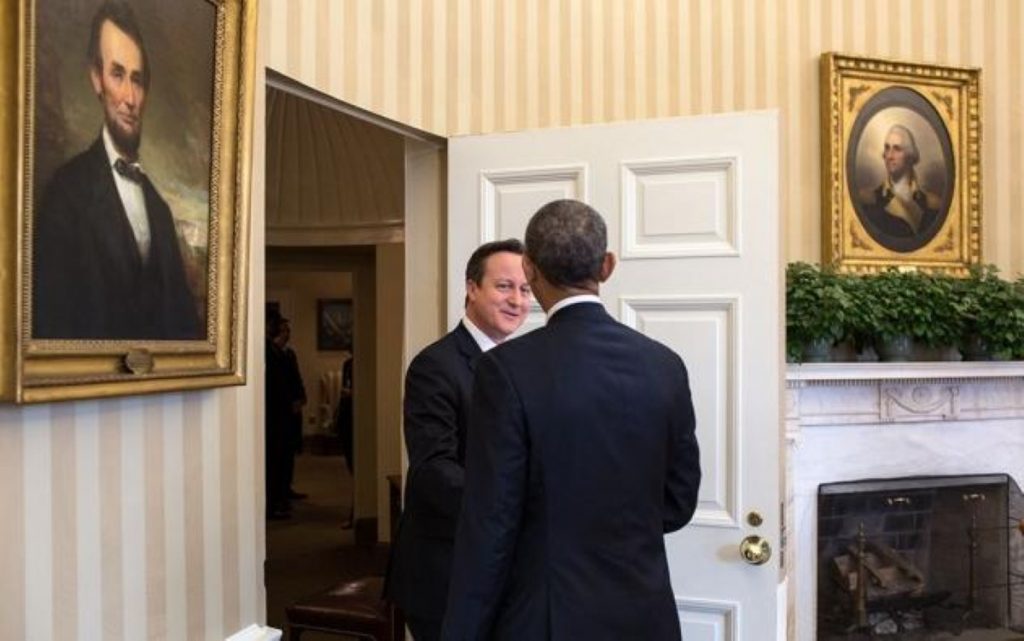Britain and America: Drifting apart?
Confirmation of the Chilcot inquiry delay plays right into David Cameron's hands: it's hiding just how strained Britain's special relationship with America is right now.
Layer upon layer of politics and diplomacy are concealing the cracks in developing British relations with America. Newspaper headlines have focused on the important question of whether Barack Obama calls David Cameron 'bro'. Journalists decide Obama's praise for Cameron's stewardship of the economy are hugely important to the 2015 general election. Now publication of the Chilcot inquiry report, which more than anything else would have exposed the biggest failure of the special relationship for decades, has been delayed until after the general election. What would have been an opportunity to question the state of this enduring alliance is sliding by.
Yet now is an apt time to take a closer look at the state of British-American relations. Exactly 200 years ago Britain and the United States ended the War of 1812. Who knew the peace begun by James Madison and Lord Liverpool would endure so long – or result in such an imposingly powerful alliance?
Their cooperation really began in earnest amidst the global turmoil of the Second World War. Nowadays, as Obama and Cameron demonstrated in the White House last week, the special relationship is talked about in terms of shared values of democracy and freedom.


Yet as British and American diplomats pat themselves on the back for two centuries of peace, the 'special relationship' is under strain in 2015.
The most potent parts of this relationship are also its most controversial. And right now, your political leaders would rather you didn't stop to think about them for too long.
War-weariness
There are those in Britain who are growing weary of our reliance on the United States. "We see ourselves as America's little poodle," Labour veteran Paul Flynn says. "We go trotting around behind them waiting to be patted on the head. We've followed like braindead lapdogs behind America into every war since Vietnam – some sensible, some worthy, some noble, but most utterly disastrous and counterproductive."
Flynn's views are not unusual in Westminster, but it took the war-weariness resulting from the conflicts in Iraq and Afghanistan to persuade a majority of MPs that backing even limited military action in Syria was a bad idea. Britain has since been willing to conduct airstrikes against the Islamic State in Iraq – but the usefulness of the UK is now in question.
Richard Ottaway, the Conservative chair of the Commons' foreign affairs committee, journeyed to Washington shortly after the Syria vote. There was no "lasting damage", he claims, but even he admits "people would inevitably reassess how Britain is to fulfil its duties on the global stage".
Atomic secrets
Everyone knows about the big military adventures of recent years, but there is much more to the special relationship than just picking a dictator to oust. A big part of the relationship has been the way in which we share nuclear expertise. This offers a "strong, symbolic value," says Paul Ingram of the British-American Security Information Council. The US and UK share technology on what's known as the 'common missile compartment' in their nuclear subs, saving millions of dollars each in the process.
Attempts to revive and maintain the nuclear dialogue are continuing. And this year the mutual defence agreement – the treaty which authorises the sharing of these secrets – was passed without much fuss in either Washington or London.
But Ingram believes the atomic factor is an overrated part of the alliance and that the "group-think" consensus on the usefulness of sharing nuclear secrets is more vulnerable than it looks. "If there was a narrative that emerged that with limited resources the British need to focus their attention on capabilities that are more valuable to the Americans, that group-think could shift quite quickly," he suggests. With the next summit on nuclear non-proliferation approaching next summer, the UK and US will be trying their hardest to cover up the true extent of their nuclear cooperation.

Nobody does it better
Even if all else fails, there's always the intelligence relationship; James Bond is always going to be a useful ally. "It's critical," Ottaway says. "To a large extent the Americans need us a bit. Though their resources dramatically exceed ours, nonetheless we play a very important role with our access into Europe and our contacts in the Middle East and Africa."
Britain and the US are the founding members of the 'Five Eyes' club, which also includes Australia, Canada and New Zealand. Over a decade ago it was alleged that between them they could intercept any telecoms message and "inspect its contents". A 2001 European parliament probe into this alarming claim didn't dismiss it outright – but it took Edward Snowden's leaks to reveal the reality.
Project Tempora, the British system which allowed it to boast it has the biggest internet access" in the special relationship, has triggered outrage around the world. While the UK lets Americans get a look-in, the British have been granted reciprocal access to the National Security Agency's Dishfire database. This, the Guardian newspaper has claimed, collects almost 200 million text messages a day from around the globe.
"Our strategic relationship will continue," Ottaway says confidently. Britain and America may be changing their nuclear stance and putting a temporary halt on their joint military adventures, but they share too many secrets to ever really fall out. That doesn't mean they won't slowly lose interest in each other, though: it's clear the spirit of cooperation that brought Tony Blair and George Bush together is diminished, even broken. When the Chilcot inquiry into the Iraq War does report, we'll realise quite how much the special relationship has changed.



